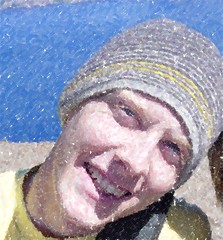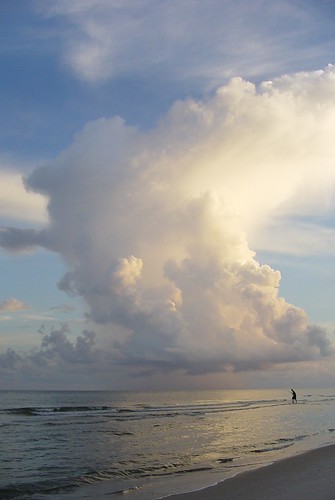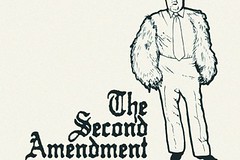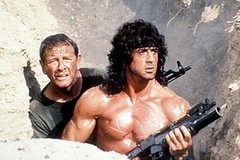I’m a big dork.
Yesterday was an extremely long day. I go to work all day (8 to 4:30, not to mention waking up at 5:30) and then hang around Nashville until 7 when my class starts and then leave class at 10 while arriving home at 11. Ugghhh. During my break between work and class I sat on Lipscomb’s campus and read some of Wendell Berry’s
Jayber Crow. Excellent read. All of a sudden I see this guy that looks vaguely familiar. The closer he gets the more I recognize the guy.
Flashback to Monday night: Jennifer and I had to wonderful pleasure of attending
Romeo, Juliet and Jesus, an evening with
Donald Miller at Otter Creek (author of
Blue Like Jazz). It was a packed house like I thought it would be. He’s talk was mainly pulled from his last book
Searching for God Knows What. I read this last year and wasn’t too impressed by it, to be honest. It was hard to top Blue Like Jazz, even though the story of Santa not washing his hands in the mall after using the potty was quite hilarious. After about an hour or so, the audience was allowed to ask a question to Donald. I wanted to ask a question but I think it was just because I could say, “I have talked to Donald Miller.” I guess to impress people. Again, I’m a dork. Well my wife was trying to get me to go up to the mic and ask my question, but I chickened out knowing that my motivation was purely out of pride. Not only did I want to ask him a relevant question, I really wanted to see if he got my CD’s I sent him.
Flashback to last November: Some colleagues of mine were traveling to Atlanta to attend the Ivy Jungle Conference. Miller was going to be teaching an Early Bird Course at the Conference and my friend Dean was signed up to be in that class. I had finished both of Miller’s books and really want to write him a letter. Dork. Not only did I write a letter, I copied a live show from a Wilco concert I had been to because I knew he enjoys their music (writes about them in Blue Like Jazz). Super Dork. Before Dean left I put the letter and the two CDs into an envelope and asked him to give it to Don. Dean came back from Ivy Jungle and completed his mission successfully.
Flash-forward to Monday night: While I was really contemplating on asking my question, I also wanted to ask Don if he received those CDs. In my mind I see the conversation going like this:
Me: Hey Don. I’m the guy that gave you those Wilco CDs back at Ivy Jungle.
Don: YEAH!! (very enthusiastically) Dude those CDs are awesome. I actually listened to them while on the plane to Nashville.
Me: Awesome! Glad you enjoyed it.
Don: I sure did. Hey what are you doing later? You wanna hang out after this?
(This would of course thrust me into extreme euphoria and to the demise of the rest of the audience for being super cool. Mmmmmahahahahaha)
Flash-forward to Yesterday or are we flashbacking here? Anyway, the guy whom I recognize (beginning of the story) is in fact Mr. Miller. I’m sure I kept eyeing him until he felt uncomfortable, but I wasn’t going to back down from this opportunity. So I get up from the swing I was on and say:
Me: Are you Donald Miller?
Don: Yeah.
(introductions and hands shake)
Me: I heard you last night at Otter Creek. Good stuff.
Don: Thanks.
Me: I’m the guy that sent you those Wilco CDs during Ivy Jungle.
Don: Huh? You don’t look familiar.
Me: Well I wasn’t at Ivy Jungle, but had a friend who was there give them to you.
Don: Really? I…..don’t remember ever getting them.
Me: Really?
Don: Yeah, I have the demo’s from Yankee Hotel Foxtrot that someone gave me.
Me: Yeah with the instrumentals and different versions.
Don: Yeah.
Me: I have that CD. But I sent you a 2-disc concert show in Atlanta.
Don: Well….I never received that.
Me: Huh? Oh well. I just knew you enjoyed them so I thought, what the heck.
Don: Well…thanks.
Me: Anyway, good to meet you.
Don:You too. What’s your name again?
I’m sure he was asking my name again so he could be aware that a guy named Clark stalks him somewhat. “Huh authorities? Yes this is Donald Miller. Be on the lookout for a really tall blonde-headed guy who will not leave me alone.” I went to class and found out that he was about to speak in front of Lipscomb and visitors. I’m sure he gave me a shout out during his talk. “If you guys know a Clark, then please call the cops.” Have I said how much of a dork I am?
 For some selfish reason, I wanted to reflect my crappy day onto everyone else. I think I was like “Debbie Downer” trying to make everyone feel sorry for me in the midst of such celebration and joy. So Gina, Terry, June, and my lovely wife…I’m sorry. Sorry I was a sulking cotton-headed ninimuggens. Forgive me.
For some selfish reason, I wanted to reflect my crappy day onto everyone else. I think I was like “Debbie Downer” trying to make everyone feel sorry for me in the midst of such celebration and joy. So Gina, Terry, June, and my lovely wife…I’m sorry. Sorry I was a sulking cotton-headed ninimuggens. Forgive me.
 For some selfish reason, I wanted to reflect my crappy day onto everyone else. I think I was like “Debbie Downer” trying to make everyone feel sorry for me in the midst of such celebration and joy. So Gina, Terry, June, and my lovely wife…I’m sorry. Sorry I was a sulking cotton-headed ninimuggens. Forgive me.
For some selfish reason, I wanted to reflect my crappy day onto everyone else. I think I was like “Debbie Downer” trying to make everyone feel sorry for me in the midst of such celebration and joy. So Gina, Terry, June, and my lovely wife…I’m sorry. Sorry I was a sulking cotton-headed ninimuggens. Forgive me.






 If you have ever been to Europe or outside of the US, you'll probably notice these large massive cathedrals jetting out from the skyline. Not only do they look rather lonesome stretching toward the heavens, inside its the same story: empty and hollow.
If you have ever been to Europe or outside of the US, you'll probably notice these large massive cathedrals jetting out from the skyline. Not only do they look rather lonesome stretching toward the heavens, inside its the same story: empty and hollow.


 I’m faced with this simple drawing from a child this morning. But this is not an image conjured up by an imaginative youngster; rather, this picture was drawn with simple crayons and paper depicting the horrific acts of the genocide seen through the eyes of a Sudanese child. The power of exclusion is all too real for these people. But do I respond by excluding their attackers? Granted, I know the Janjaweed’s injustice is great and needs to be stopped. I am not trying to justify their act by any means. But could I embrace one of them? That is what I’m trying to understand this morning.
I’m faced with this simple drawing from a child this morning. But this is not an image conjured up by an imaginative youngster; rather, this picture was drawn with simple crayons and paper depicting the horrific acts of the genocide seen through the eyes of a Sudanese child. The power of exclusion is all too real for these people. But do I respond by excluding their attackers? Granted, I know the Janjaweed’s injustice is great and needs to be stopped. I am not trying to justify their act by any means. But could I embrace one of them? That is what I’m trying to understand this morning.